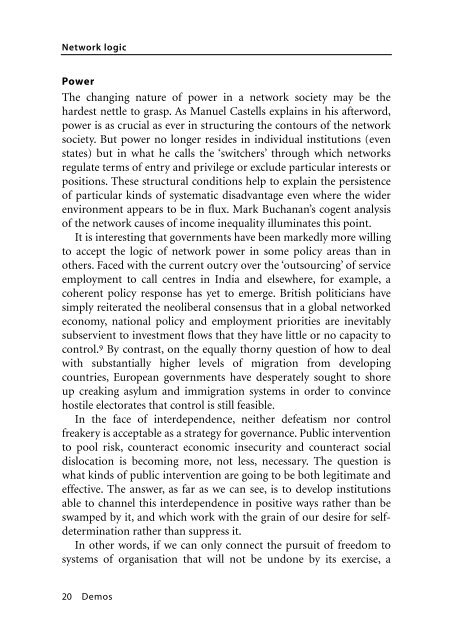Network Logic - Index of
Network Logic - Index of
Network Logic - Index of
Create successful ePaper yourself
Turn your PDF publications into a flip-book with our unique Google optimized e-Paper software.
<strong>Network</strong> logic<br />
Power<br />
The changing nature <strong>of</strong> power in a network society may be the<br />
hardest nettle to grasp. As Manuel Castells explains in his afterword,<br />
power is as crucial as ever in structuring the contours <strong>of</strong> the network<br />
society. But power no longer resides in individual institutions (even<br />
states) but in what he calls the ‘switchers’ through which networks<br />
regulate terms <strong>of</strong> entry and privilege or exclude particular interests or<br />
positions. These structural conditions help to explain the persistence<br />
<strong>of</strong> particular kinds <strong>of</strong> systematic disadvantage even where the wider<br />
environment appears to be in flux. Mark Buchanan’s cogent analysis<br />
<strong>of</strong> the network causes <strong>of</strong> income inequality illuminates this point.<br />
It is interesting that governments have been markedly more willing<br />
to accept the logic <strong>of</strong> network power in some policy areas than in<br />
others. Faced with the current outcry over the ‘outsourcing’ <strong>of</strong> service<br />
employment to call centres in India and elsewhere, for example, a<br />
coherent policy response has yet to emerge. British politicians have<br />
simply reiterated the neoliberal consensus that in a global networked<br />
economy, national policy and employment priorities are inevitably<br />
subservient to investment flows that they have little or no capacity to<br />
control. 9 By contrast, on the equally thorny question <strong>of</strong> how to deal<br />
with substantially higher levels <strong>of</strong> migration from developing<br />
countries, European governments have desperately sought to shore<br />
up creaking asylum and immigration systems in order to convince<br />
hostile electorates that control is still feasible.<br />
In the face <strong>of</strong> interdependence, neither defeatism nor control<br />
freakery is acceptable as a strategy for governance. Public intervention<br />
to pool risk, counteract economic insecurity and counteract social<br />
dislocation is becoming more, not less, necessary. The question is<br />
what kinds <strong>of</strong> public intervention are going to be both legitimate and<br />
effective. The answer, as far as we can see, is to develop institutions<br />
able to channel this interdependence in positive ways rather than be<br />
swamped by it, and which work with the grain <strong>of</strong> our desire for selfdetermination<br />
rather than suppress it.<br />
In other words, if we can only connect the pursuit <strong>of</strong> freedom to<br />
systems <strong>of</strong> organisation that will not be undone by its exercise, a<br />
20 Demos
















